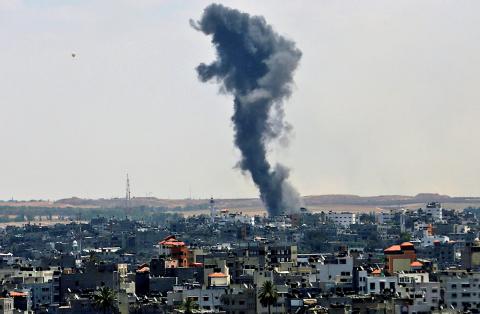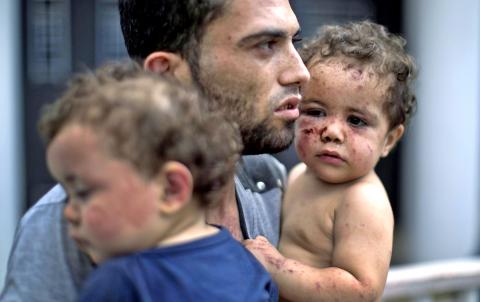Israel yesterday stepped up its land offensive in Gaza with artillery, tanks and gunboats, and warned it could “significantly widen” an operation Palestinian officials said was killing ever greater numbers of civilians.
Palestinian health officials said 27 Palestinians, including a baby, two children and a 70-year-old woman, had been killed since Israel sent ground forces into the densely populated strip of 1.8 million Palestinians on Thursday.
The Israeli military said it killed 17 Palestinian gunmen, while 13 surrendered and were taken for questioning after the infantry and tank assault began in the Islamist Hamas-dominated territory.

Photo: EPA
One Israeli soldier was killed and several others were wounded in the operations, in which some 150 targets, including 21 concealed rocket launchers and four tunnels, have been attacked, the military said.
The land advance followed 10 days of barrages against Gaza from air and sea, hundreds of rockets fired by Hamas into Israel and failed Egyptian attempts to secure a ceasefire.
Rocket salvoes, many of them intercepted by the Iron Dome anti-missile shield system, continued yesterday against southern Israel, police said, causing no casualties.

Photo: AFP
“We chose to start this operation after we exhausted other options and reached the conclusion that without it we could pay a much higher price,” Israeli Prime Minister Benjamin Netanyahu told reporters before a special Cabinet session at Tel Aviv military headquarters. “The main goal is to restore quiet.”
“My instructions ... to the Israeli army, with the approval of the security Cabinet, is to prepare for the possibility of a widening, a significant widening of the ground operation,” he said.
He did not say what form a broadened offensive might take. Israel says its forces have focused so far on seeking out tunnels Palestinian militants might use for cross-border raids.
One such infiltration was narrowly thwarted on Thursday, with the army saying it had repelled 13 Hamas gunmen after they emerged from a tunnel close to an Israeli farming community.
To back up regular forces, Israel said it was calling up 18,000 military reservists, adding to 30,000 already mobilized.
Hamas spokesman Sami Abu Zuhri responded with defiance to the Israeli escalation.
“Netanyahu is killing our children and will pay the price. The ground invasion doesn’t frighten us and the occupation army will sink in Gaza’s mud,” he said.
Hamas wants Israel and Egypt, whose military-backed government is at odds with the Palestinian Islamists, to lift border restrictions that have deepened Gaza’s economic hardship and unemployment.
Pope Francis yesterday telephoned Israeli President Shimon Peres and West Bank-based Palestinian President Mahmoud Abbas to express his “very grave concerns” over the conflict in Gaza, the Vatican said.
“A small group of fanatics are the cause of suffering in Gaza. Israel is doing everything to lower the flames and minimise civilian casualties,” Peres replied, according to a statement from the president’s office.
In all, 260 Palestinians, most of them civilians, have been killed since the fighting, which has destroyed or damaged hundreds of homes, began on Tuesday last week, Gaza officials said.

MAKING WAVES: China’s maritime militia could become a nontraditional threat in war, clogging up shipping lanes to prevent US or Japanese intervention, a report said About 1,900 Chinese ships flying flags of convenience and fishing vessels that participated in China’s military exercises around Taiwan last month and in January last year have been listed for monitoring, Coast Guard Administration (CGA) Deputy Director-General Hsieh Ching-chin (謝慶欽) said yesterday. Following amendments to the Commercial Port Act (商港法) and the Law of Ships (船舶法) last month, the CGA can designate possible berthing areas or deny ports of call for vessels suspected of loitering around areas where undersea cables can be accessed, Oceans Affairs Council Minister Kuan Bi-ling (管碧玲) said. The list of suspected ships, originally 300, had risen to about

DAREDEVIL: Honnold said it had always been a dream of his to climb Taipei 101, while a Netflix producer said the skyscraper was ‘a real icon of this country’ US climber Alex Honnold yesterday took on Taiwan’s tallest building, becoming the first person to scale Taipei 101 without a rope, harness or safety net. Hundreds of spectators gathered at the base of the 101-story skyscraper to watch Honnold, 40, embark on his daredevil feat, which was also broadcast live on Netflix. Dressed in a red T-shirt and yellow custom-made climbing shoes, Honnold swiftly moved up the southeast face of the glass and steel building. At one point, he stepped onto a platform midway up to wave down at fans and onlookers who were taking photos. People watching from inside

Japan’s strategic alliance with the US would collapse if Tokyo were to turn away from a conflict in Taiwan, Japanese Prime Minister Sanae Takaichi said yesterday, but distanced herself from previous comments that suggested a possible military response in such an event. Takaichi expressed her latest views on a nationally broadcast TV program late on Monday, where an opposition party leader criticized her for igniting tensions with China with the earlier remarks. Ties between Japan and China have sunk to the worst level in years after Takaichi said in November that a hypothetical Chinese attack on Taiwan could bring about a Japanese

The WHO ignored early COVID-19 warnings from Taiwan, US Deputy Secretary of Health and Human Services Jim O’Neill said on Friday, as part of justification for Washington withdrawing from the global health body. US Secretary of State Marco Rubio on Thursday said that the US was pulling out of the UN agency, as it failed to fulfill its responsibilities during the COVID-19 pandemic. The WHO “ignored early COVID warnings from Taiwan in 2019 by pretending Taiwan did not exist, O’Neill wrote on X on Friday, Taiwan time. “It ignored rigorous science and promoted lockdowns.” The US will “continue international coordination on infectious